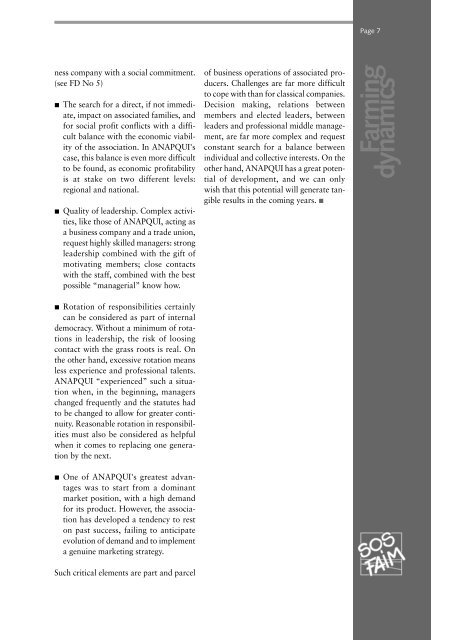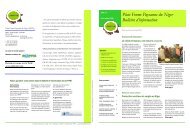ANAPQUI, a producer's experience with quinoa - SOS Faim
ANAPQUI, a producer's experience with quinoa - SOS Faim
ANAPQUI, a producer's experience with quinoa - SOS Faim
You also want an ePaper? Increase the reach of your titles
YUMPU automatically turns print PDFs into web optimized ePapers that Google loves.
ness company <strong>with</strong> a social commitment.<br />
(see FD No 5)<br />
The search for a direct, if not immediate,<br />
impact on associated families, and<br />
for social profit conflicts <strong>with</strong> a difficult<br />
balance <strong>with</strong> the economic viability<br />
of the association. In <strong>ANAPQUI</strong>'s<br />
case, this balance is even more difficult<br />
to be found, as economic profitability<br />
is at stake on two different levels:<br />
regional and national.<br />
Quality of leadership. Complex activities,<br />
like those of <strong>ANAPQUI</strong>, acting as<br />
a business company and a trade union,<br />
request highly skilled managers: strong<br />
leadership combined <strong>with</strong> the gift of<br />
motivating members; close contacts<br />
<strong>with</strong> the staff, combined <strong>with</strong> the best<br />
possible “managerial” know how.<br />
Rotation of responsibilities certainly<br />
can be considered as part of internal<br />
democracy. Without a minimum of rotations<br />
in leadership, the risk of loosing<br />
contact <strong>with</strong> the grass roots is real. On<br />
the other hand, excessive rotation means<br />
less <strong>experience</strong> and professional talents.<br />
<strong>ANAPQUI</strong> “<strong>experience</strong>d” such a situation<br />
when, in the beginning, managers<br />
changed frequently and the statutes had<br />
to be changed to allow for greater continuity.<br />
Reasonable rotation in responsibilities<br />
must also be considered as helpful<br />
when it comes to replacing one generation<br />
by the next.<br />
One of <strong>ANAPQUI</strong>'s greatest advantages<br />
was to start from a dominant<br />
market position, <strong>with</strong> a high demand<br />
for its product. However, the association<br />
has developed a tendency to rest<br />
on past success, failing to anticipate<br />
evolution of demand and to implement<br />
a genuine marketing strategy.<br />
Such critical elements are part and parcel<br />
of business operations of associated producers.<br />
Challenges are far more difficult<br />
to cope <strong>with</strong> than for classical companies.<br />
Decision making, relations between<br />
members and elected leaders, between<br />
leaders and professional middle management,<br />
are far more complex and request<br />
constant search for a balance between<br />
individual and collective interests. On the<br />
other hand, <strong>ANAPQUI</strong> has a great potential<br />
of development, and we can only<br />
wish that this potential will generate tangible<br />
results in the coming years. <br />
Page 7<br />
Farming<br />
dynamıcs



